Brand loyalty and emotional loyalty: A comparative study between Coca Cola and Pepsi Co
Added on 2020-11-12
39 Pages13790 Words131 Views
ContentsTitle: Brand loyalty and emotional loyalty: A comparative study between Coca Cola and Pepsi Co......3Chapter 1: Introduction.........................................................................................................................3Scope of research..................................................................................................................................3Rationale of research.............................................................................................................................3Chapter preview....................................................................................................................................4Chapter 1: Introduction.........................................................................................................................4Chapter 2: Literature Review.................................................................................................................5Chapter 3: Research Methodology........................................................................................................5Chapter 4: Findings, Analysis/Discussion..............................................................................................5Chapter 5: Conclusions and Recommendations ....................................................................................5Chapter 2: Literature Review.................................................................................................................6The concept of emotional loyalty and brand loyalty.............................................................................6Key factors of emotional loyalty which influence brand loyalty............................................................8Chapter 3: Research Methodology .....................................................................................................101| P a g e
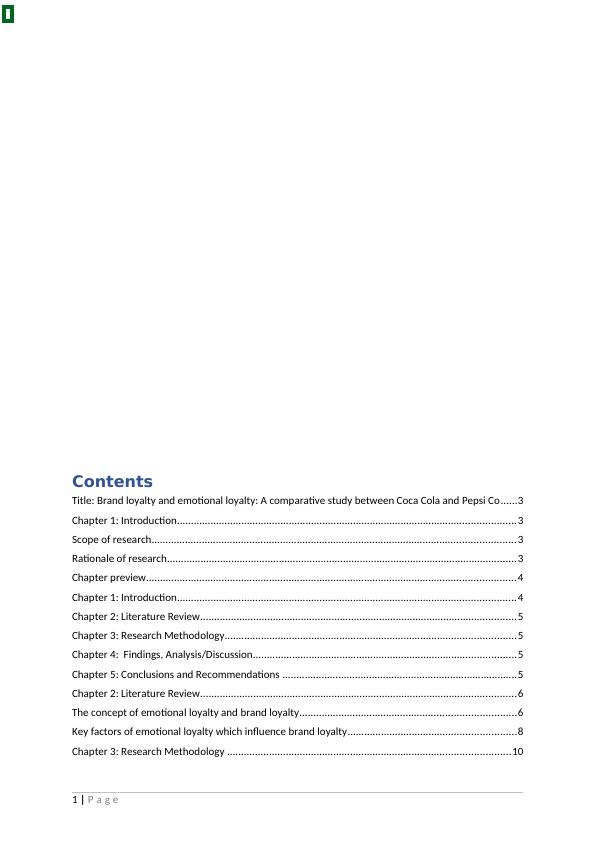
Research Methodology........................................................................................................................10Research approach..............................................................................................................................11Ethical consideration...........................................................................................................................11Data collection methods .....................................................................................................................12Chapter 4: Findings, Analysis and Discussion – A case study of Coca Cola and PepsiCo .....................12The key role of emotional loyalty and brand loyalty in maintaining customer retention in the beverage industry................................................................................................................................13Coke and Pepsi- Advertising as part of attaining brand and emotional loyalty ...................................15Different ways by which Coca Cola and Pepsi Co could enhance brand and emotional loyalty in the beverage industry ...............................................................................................................................17Concept of brand loyalty and emotional loyalty..................................................................................21Key factor of emotional loyalty influences brand loyalty.....................................................................22Key role emotional loyalty and brand loyalty in maintaining customer sustainability.........................23Different ways by which emotional loyalty and brand loyalty can be enhanced.................................24Chapter 5: Conclusion and Recommendations ...................................................................................25Conclusions..........................................................................................................................................25Recommendations...............................................................................................................................26Reflection.............................................................................................................................................27REFERENCES.........................................................................................................................................27Books and Journals..............................................................................................................................27Online..................................................................................................................................................302| P a g e
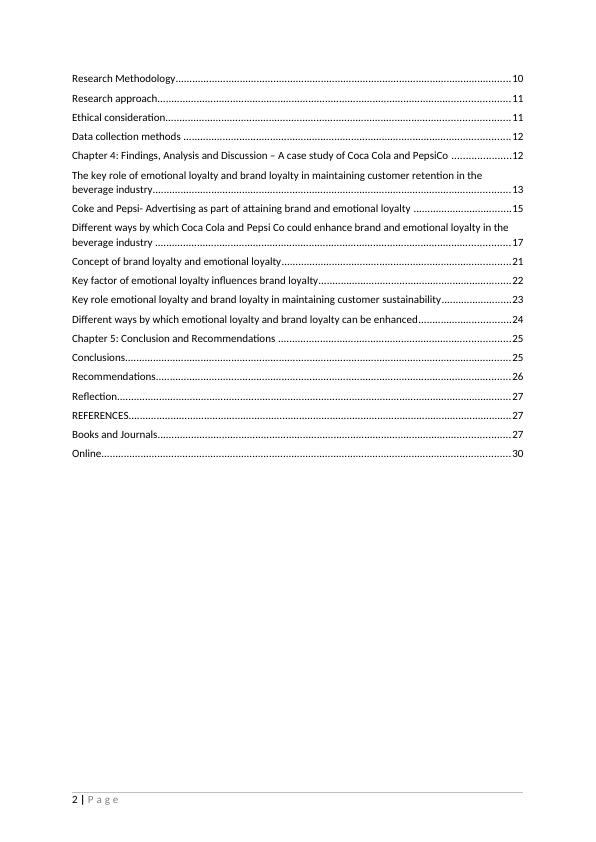
Title: Brand loyalty and emotional loyalty: A comparative study between Coca Cola and Pepsi CoChapter 1: IntroductionThe aim of this dissertation is to analyse the controversial phenomenon, brand loyalty,which today is a controversial topic as many scholars and marketing specialists have been defining brand loyalty as the key element for every major business in the world. Due to the fact that brand loyalty is such a controversial topic, the thesis willalso focus on emotional loyalty and all of its aspects (Bowen and Chen McCain, 2015). This dissertation will present and define brand loyalty, with an emphasis on emotionalloyalty. Brand loyalty refers to a positive aspect, where individuals shows their loyalty and dedication towards a single product or services from a single brand or company since very long. On the other hand, emotional loyalty is both a positive and negative factor which highlyinfluences the brand loyalty of a company. It is one of the most powerful influencing factors which highly affects the business performance of the company in competitive marketplace. Two major companies will be used as an example of how they perceive brand loyalty and emotional loyalty (Ding and Tseng, 2015). For the current study, investigator has chosen Coca Cola and PEPSICO. Both of these companies are among the leading companies of beverages industry. Also, various aspects related to brand loyalty and emotional loyalty are going to be covered in the present report. The researcher has developed an aim and objectivesfor conducting the research in order to attain the desired resultScope of researchThe aim of the research question is to analyse what brand loyalty is for each of the chosen companies, PEPSI. Co. and COCA COLAand how these companies have established emotional loyalty in order to keep customers satisfied and loyal. The investigation holds a huge importance for the beverage industry as this dissertation could also be of interest for other companies that desire to place themselves better in the market. By learning and understanding how these companies define brand loyalty and what strategies they use in order to maintain it, the interested parts in the beverage industry may also learn from the pros and cons of the above-mentioned companies.Rationale of researchThe main purpose for choosing this research topic is to enhance knowledge by analysing both PEPSICO and Coca Cola with emphasis on brand loyalty and emotional loyalty in order to improve their sustainability at market place. The chosen topic is highly important as with the passing of time, the competition in the beverage industry is increasing daily. Therefore, with the help of this research, the management of these companies will be able to discover and learn about different ways by which they can improve their brand loyaltyamong customers. As a result, this will aid them in enhancing their sustainability in the market place. In this regard, valuable aim, objectives and research questions for the current study have been defined as below3| P a g e
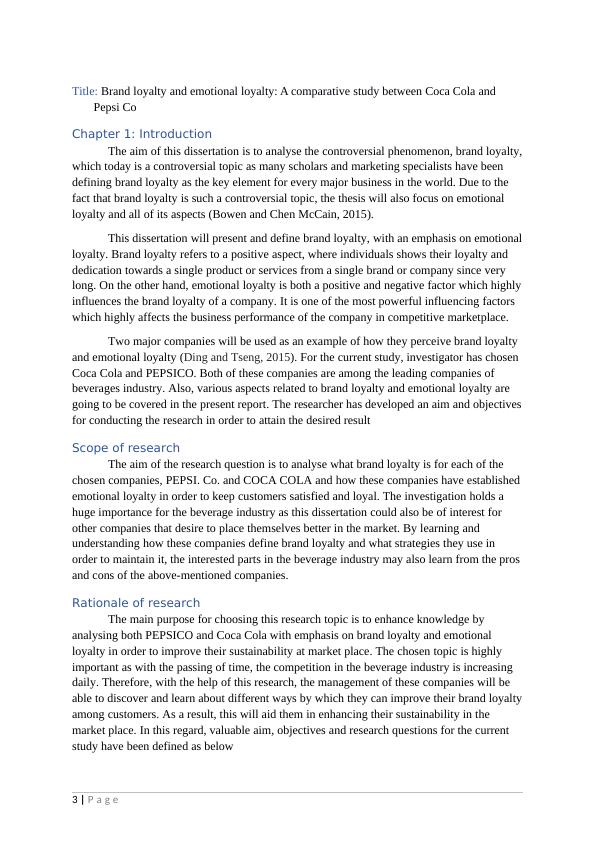
Research aimThe aim for the current dissertation is “To analyse the effectiveness of brand loyalty and emotional loyalty for customers in beverage industry”. A comparative analysis of Coca Cola and PEPSICO.Research ObjectivesTo understand the concept of brand loyalty and emotional loyalty.To identify various key factor of emotional loyalty which influences brand loyalty.To evaluate the key role of emotional loyalty and brand loyalty in maintaining customer retention in the beverage industry.To identify different ways by which emotional loyalty and brand loyalty could be enhanced in the beverage industry.Research QuestionsWhat is the concept of brand loyalty and emotional loyalty?How various key factor of emotional loyalty influences brand loyalty?What is the key role of emotional loyalty and brand loyalty in maintaining customer retention in the beverage industry?What are the different ways by which emotional loyalty and brand loyalty can be enhanced in the beverage industry?Chapter previewChapter 1: IntroductionThe first chapter of this dissertation is an introduction section which includes information about the overall investigation. The section provides a brief overview to the reader about the research topic. The section includes information about the topic, rationale of research, scope of study, research aim and objectives and lastly the research questions (Hemsley-Brown and Alnawas, 2016). The information offers an overview regarding what the whole research is about, what are the proposed outcomes expected by the investigator from the research etcChapter 2: Literature ReviewThe second chapter of this research represents the literature review used on the formulated research questions. This section provides the answers of each and every research question developed from the research objectives. 4| P a g e
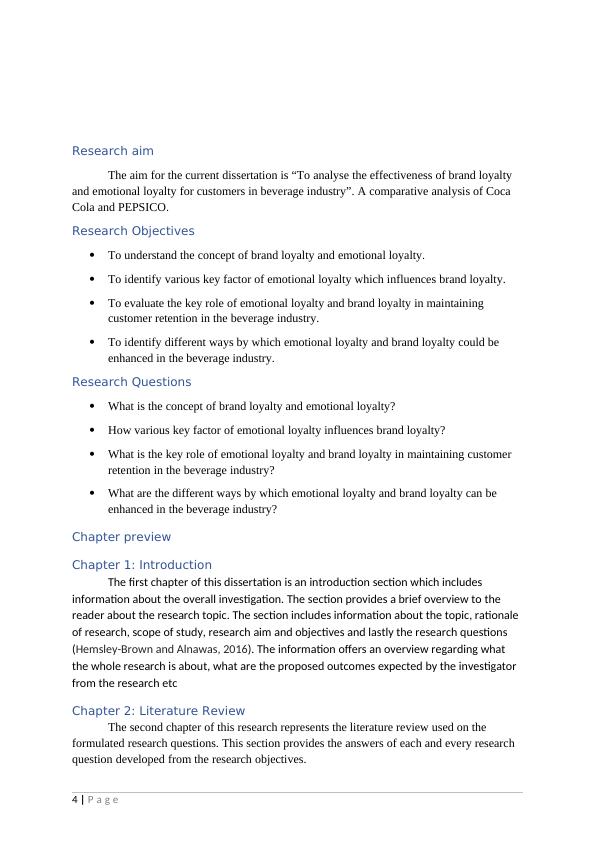
With reference to the current investigation, this section provides answers for different research questions from the point of view of different authors. It can be said that, the main purpose of the researcher is to discover different articles, books and journals that could provide valuable information regarding the topic. This section also criticises the thoughts given by some authors from their different point of view. As a result, by going through this section readers can easily develop their knowledge over different theories and their meaning seen from various perspectives of different authors.Chapter 3: Research MethodologyAfter the Literature Review section, the next chapter describes the research methodological section which includes different tools and techniques through which the researcher could gain an effective outcome for the current study. With reference to present study, it can be said that this section initially covers information about the different types of research methodologies, research philosophies, research approaches and data collection methods with their different sources. After providing detailed information concerning these methods, the researcher describes later on the methods chosen along with his satisfactory justification. Chapter 4: Findings, Analysis/DiscussionThis chapter describes the various findings concerning the two involved major companies Coca Cola and PepsiCo in the form of a case study with subchapters which illustrate different ways trough which these companies maintain brand loyalty and emotional loyalty in order to create a distinction between the two based on pros and cons of both companies in the beverage industry.Chapter 5: Conclusions and Recommendations Lastly, the Conclusion section represents the overall research of the study. In this section, the author mainly focuses on providing detailed information about the findings of the whole research. The conclusion is given in the form of a summary where the overview ofthe research is given by the investigator himself (Levy and Hino, 2016). It is given in the formof summary which aids the reader in finding out whether the researcher will be able to fulfil the aim or not. Also, in this section, all the findings, aims and objectives of the research are explained in detail.Chapter 2: Literature ReviewThe concept of emotional loyalty and brand loyaltyLee and Workman, (2015), states that emotional loyalty refers to the overall emotional connection of customers towards a single brand which influences them to willingly spend upon a particular brand. Emotional loyalty refers to the process where 5| P a g e
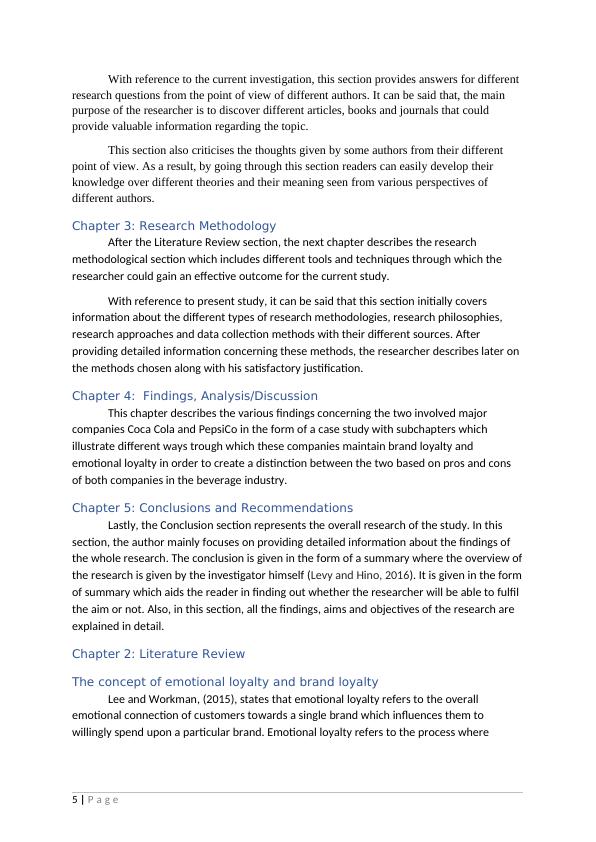
consumers ignore the factors such as price, convenience and all other factors as they have a personal or emotional connection with the particular brand. Customers feel an emotional connection with the products which as a result does not change due to its price, quality and other elements. Emotional loyalty helps the company in order to increase their performance as well as growth in the marketplace (Lee and Workman, 2015). For instance, some customers have emotional loyalty towards PEPSICO as price, quality and other factors do not affect the customer's perception towards the brand. On the other hand, brand loyalty refers to the positive influence of a particular product on customers, influencing them to do repetitive purchasing. Brand loyalty can be defined also as the faithfulness of customers towards a particular brand which is expressed through a continuous purchase of a specific product (Yeh, Wang and Yieh, 2016). When consumers satisfy their needs and wants, they start purchasing products on a regular basis which shows their commitment towards the company and its products. It has been said that brand loyalty is an emotionally charged decision taken by consumers relating to a particular product. The reason behind purchasing a particular brand is that customers have the perception that their requirements are being fulfilled only by a particular brand. Both terms are interrelated with each other as marketing teams focus on connecting with the customers emotionally and then influence them to become loyal towards the brand (Bilgihan 2016)With the help of the emotional loyalty of consumers, the marketing teams develop strategies in order to retain their customers and make them loyal towards their brand.With reference to the beverage industry, it can be said that if a renowned company like Coca Cola holds a good emotional connection with its customers this would contribute to the enhancement of brand loyalty which is crucial for the company's growth and profitability. Looking at another perspective of topic, Lloyd (2016), expressed that brand loyalty is highly connected with the emotional attachment between individuals and particular brands.It can be further mentioned that the consumption of these products always offers anequivalent satisfaction towards individuals. Therefore, they do not feel the requirement of using any alternative product that could give a pleasant experience. In addition, emotions are seen as the key factor of brand loyalty which ultimately influence the interest of customers towards companies and also makes them loyal for longer periods of time (Kandampully, Zhang and Bilgihan, 2015). With reference to the beverage industry, it has been analysed that emotional loyalty is considered the main factor that drives the brand loyalty of a company. It can also be said that if companies such as Pepsi Co or Coca Cola wish to enhance their brand loyalty among customers, their marketing or customer relations department would be required to initially connect with customers on an emotional level in order to keep them loyal brand loyal for longer periods of time thus leading to the enhancement of profitability (Bowen and Chen McCain 2015)6| P a g e
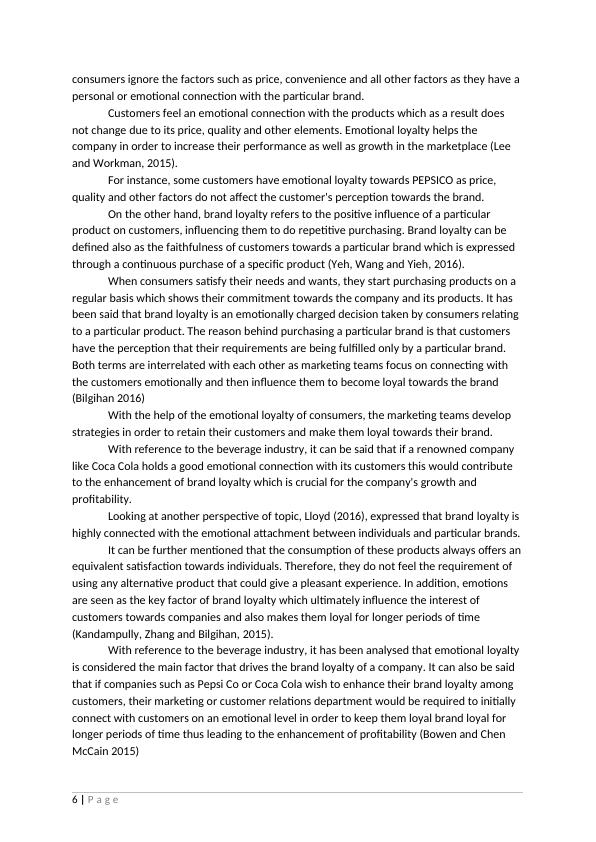
According to the above paragraphs, emotional loyalty is the positive factor that influences brand loyalty. This influence is so powerful that it could impact the business performance of the company both positively and negatively. A positive influence of emotional loyalty on the business performance of the company refers to the fact that if customers are emotionally loyal towards the company then it is easier for them to influence customers towards them. For instance, if an individual is emotionally loyal towards the company then he would not be bothered about price or other factors affecting his level of satisfaction. These customers have a positive relationship with the particular product whichultimately influences them to ignore all the other factors that might make them changetheir mind. As a result, these consumers will remain loyal to the company forever timewithout even considering other companies offering other brands. Emotionally loyalcustomers are psychological bend towards the particular company which will not enablethem to give preference to other companies. This clearly shows a positive influence ofemotional loyalty over the performance of company (Zhang, Benyoucef and Zhao, 2016).On the other hand, from a critical perspective the negative influence of emotionalloyalty over the performance of the company must be mentioned. It has been observed thatif the customers do not have an emotional connection with the company the result will bethat competitors could easily persuade them towards their own organisation. This directlyaffects the performance of the “home company”. In addition, emotionally weak customers will not remain faithful to the same brand.These customers directly switch products according to their mood and pocket (Huang,2017). For instance: if an individual is not emotionally connected to the company then hewill easily move on to another brand according to the fluctuation in the prices. Thisfluctuation also influences them to completely switch brands. As a result, this will negativelyinfluence the emotional loyalty and performance of the company for not being able toretain its loyal customers.Critically speaking, companies would be required to formulate ads in a manner thatwill influence the interest of customers towards them and it could be effectively achieved byinfluencing customers that are emotionally loyal towards them.Key factors of emotional loyalty which influence brand loyaltyAccording to Fatma, Khan and Rahman, (2016), it has been demonstrated that there are numerous key factors of emotional loyalty which directly influence brand loyalty. These factors mainly include language, convenience, memory, accessibility and personalised services offered by companies. In the context of the beverage industry, it can be said that if these factors do not work effectively then it would directly influence the overall brand loyalty and ultimately impacting the sales and performance of companies. It has been further analysed that emotional loyalty plays an essential role in influencing customers as emotionally loyal customers are psychologically connected to the 7| P a g e
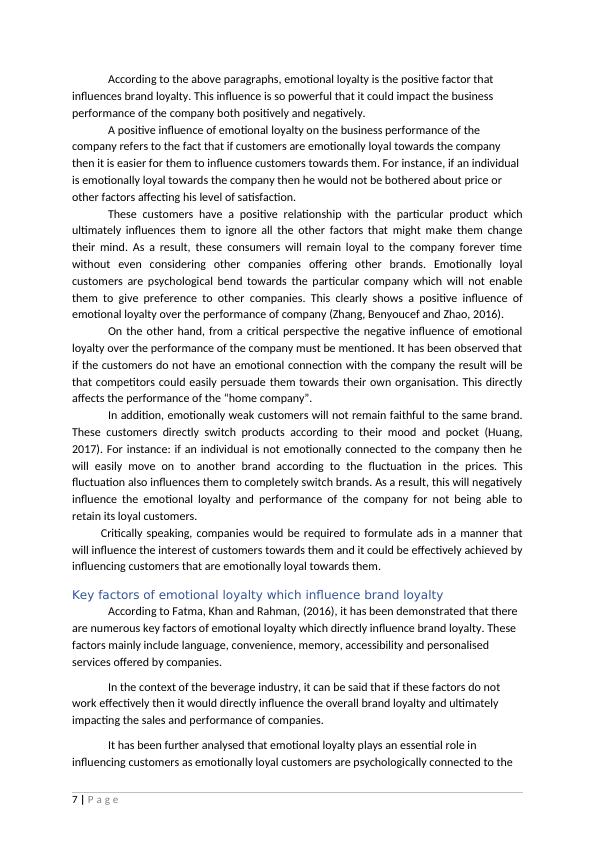
company which ultimately leads to their loyalty towards the company (Urueña and Hidalgo, 2016). All of the above factors of brand loyalty are detailed in order to have a better understanding concerning them. Psychological factors are essential as they directly influence the interest of customers towards the particular brand which makes them connected with the specific product emotionally. This emotional connection makes the customers loyal towards a company in every manner (Ozuem, Thomas and Lancaster, 2016).These psychological factors directly influence brand loyalty as if the mind of a personis connected with the company then they will automatically recommend friends and others to purchase the products of the same company. For instance, if an individual is emotionally connected to Coca Cola, he will incorporate their soft beverages in their every celebration. This emotional connection towards Coca Cola states that these people have been connectedwith the company for many years (Chen 2015) Personalised services are seen as another factor of emotional loyalty which influences the interest of customers towards the organisation. Personalised services are those services which are offered to customers according to their requirements (Leckie, Nyadzayo and Johnson, 2016). With regards to the beverage industry, if companies offer personalised services to its customers, then they emotionally connect with customers. Customers often feel attracted to those companies which offer services according to their requirement.For instance, while discussing about Coca Cola initiative taken towards the personalised services, it has been seen that the company has introduced personalised services for its customers where they can share coke can with their own name or preferred name. This type of customized service attracts customers as they can use this services for gifting purpose which ultimately develops emotional loyalty towards the company (IsYour NameOn a Coke Bottle, 2019). One of its screen shot is represented below for understanding this services of Coca Cola in right manner. 8| P a g e
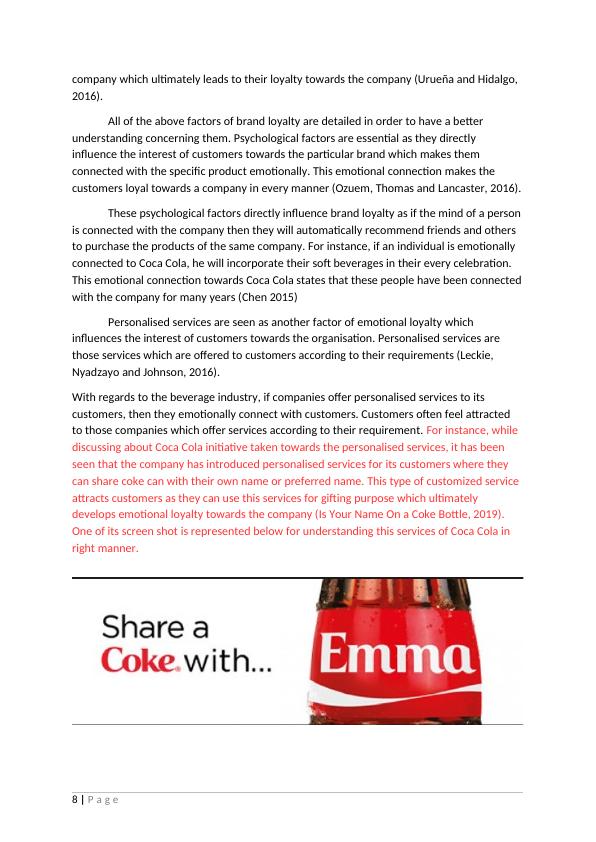
End of preview
Want to access all the pages? Upload your documents or become a member.
Related Documents
Research Project Assignment - Brand Loyalty in Soft Drink Industry of UKlg...
|24
|6230
|148
Comparative Analysis of Coke and PepsiCo Reportlg...
|25
|5942
|129
Analysis of the Coca Cola Companylg...
|18
|3099
|417
What is Holistic Marketing and How To Achieve Itlg...
|24
|6463
|15
Assessment of Coca-Cola's Success in Competitive Marketlg...
|12
|2553
|336
Impact of Brand Awareness on Customer Loyalty: A Case Study of MTN Group Limitedlg...
|92
|20268
|149
